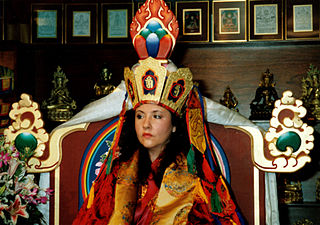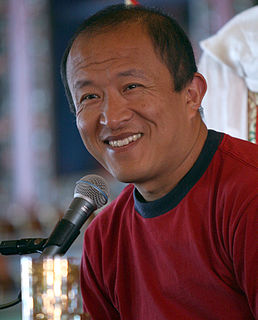Top 133 Quotes & Sayings by Famous Lamas
Explore popular quotes by famous lamas.
Switch on the television or glance at the newspaper: You will see death everywhere. Yet, did the victims of those plane crashes and car accidents expect to die? They took life for granted, as we do. How often do we hear stories of people whom we know, or even friends, who died unexpectedly? We don't even have to be ill to die: Our bodies can suddenly break down and go out of order, just like our cars. We can be quite well one day, then fall sick and die the next.
Devote the mind to confusion and we know only too well, if we´re honest, that it will become a dark master of confusion, adept in its addictions, subtle and perversely supple in its slaveries. Devote it in meditation to the task of freeing itself from illusion, and we will find that, with time, patience, discipline, and the right training, our mind will begin to unknot itself and know its essential bliss and clarity.
Devotion {to the spiritual master} becomes the purest, quickest, and simplest way to realize the nature of our mind and all things. As we progress in it, the process reveals itself as wonderfully interdependent: We, from our side, try continually to generate devotion; the devotion we arouse itself generates glimpses of the nature of mind, and these glimpses only enhance and deepen our devotion to the master who is inspiring us. So in the end devotion springs out of wisdom: devotion and the living experience of the nature of mind becomes inseparable, and inspire one another.
For most of us, karma and negative emotions obscure the ability to see our own intrinsic nature, and the nature of reality. As a result we clutch on to happiness and suffering as real, and in our unskillful and ignorant actions go on sowing the seeds of our next birth. Our actions keep us bound to the continuous cycle of worldly existence, to the endless round of birth and death. So everything is at risk in how we live now at this very moment: How we live now can cost us our entire future.
Again and again we need to appreciate the subtle workings of the teachings and the practice, and even when there is no extraordinary, dramatic change, to persevere with calm and patience. How important it is to be skillful and gentle with ourselves, without becoming disheartened or giving up, but trusting the spiritual path and knowing that it has its own laws and its own dynamics.
Looking at the world today, we might easily forget that the main purpose of our life - you could call it the heart of being human - is to be happy. All of us share the same wish, and the same right, to seek happiness and avoid suffering. Even following a spiritual path, or the religious life, is a quest for happiness.
Quoting Dudjom Rinpoche on the buddha-nature: No words can describe it No example can point to it Samsara does not make it worse Nirvana does not make it better It has never been born It has never ceased It has never been liberated It has never been deluded It has never existed It has never been nonexistent It has no limits at all It does not fall into any kind of category
Sit, then, as if you were a mountain, with all the unshakeable, steadfast majesty of a mountain. A mountain is completely natural and at ease with itself, however strong the winds that try to bother it, however thick the dark clouds that swirl around its peak. Sitting like a mountain, let your mind rise and fly and soar
The point is not how long you meditate; the point is whether the practice actually brings you to a certain state of mindfulness and presence, where you are a little open and able to connect with your heart essence. And five minutes of wakeful sitting practice is of far greater value than twenty minutes of dozing!
Without our familiar props, we are faced with just ourselves, a person we do not know, an unnerving stranger with whom we have been living all the time but we never really wanted to meet. Isn't that why we have tried to fill every moment of time with noise and activity, however boring or trivial, to ensure that we are never left in silence with this stranger on our own?
Ask yourself these two questions: Do I remember at every moment that I am dying, and that everyone and everything else is, and so treat all beings at all times with compassion? Has my understanding of death and impermanence become so keen and so urgent that I am devoting every second to the pursuit of enlightenment? If you can answer "yes" to both of these, then you really understand impermanence.
In meditation take care not to impose anything on the mind, or to tax it. When you meditate there should be no effort to control, and no attempt to be peaceful. Don't be overly solemn or feel that you are taking part in some special ritual; let go even of the idea that you are meditating. Let your body remain as it is, your breath as you find it, and remain in your natural condition of unchanging pure awareness.
I remember how people would often come to see my master Jamyang Khyentse simply to ask for his guidance for the moment of death. He was so loved and revered throughout Tibet, especially in the eastern province of Kham, that some would travel for months on end to meet him and get his blessing just once before they died. All my masters would give this as their advice, for this is the essence of what is needed as you come to die: "Be free of attachment and aversion. Keep your mind pure. And unite your mind with Buddha."
Modern civilization is largely devoted to the pursuit of the cult of delusion. There is no general information about the nature of mind. It is hardly ever written about by writers or intellectuals; modern philosophers do not speak of it directly; the majority of scientists deny it could possibly be there at all. It plays no part in popular culture: no one sings about it, no one talks about it in plays, and it's not on TV. We are actually educated into believing that nothing is real beyond what we can perceive with our ordinary senses.
Even if they don't know that you are practicing for them, you are helping them and in turn they are helping you. They are actively helping you to develop your compassion, and so to purify and heal yourself. For me, all dying people are teachers, giving to all those who help them a chance to transform themselves through developing their compassion.
Renunciation mind has nothing to do with sacrificing. When we talk about renunciation, somwhow we get all scared because we think that we have to give up some goodies, somehing valuable, some important things. But there is nothing that is important; there is nothing that is solidly exisiting. All that you are give up is actually a vague identity . You realize thigs is not true; it's noe the ultimate. This how and why to develop renunciation
The real glory of meditation lies not in any method but in its continual living experience of presence, in its bliss, clarity, peace, and most important of all, complete absence of grasping. The diminishing of grasping in yourself is a sign that you are becoming freer of yourself. And the more you experience this freedom, the clearer the sign that the ego and the hopes and fears that keep it alive are dissolving, and the closer you will come to the infinitely generous "wisdom of egolessness."
. . . when the nature of mind is introduced by a master, it is just too simple for us to believe. Our ordinary mind tells us this cannot be, there must be something more to it than this. It must surely be more "glorious", with light blazing in space around us, angels with flowing golden hair swooping down to meet us, and a deep Wizard of Oz voice announcing, "Now you have been introduced to the nature of your mind." There is no such drama.


